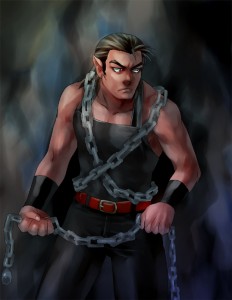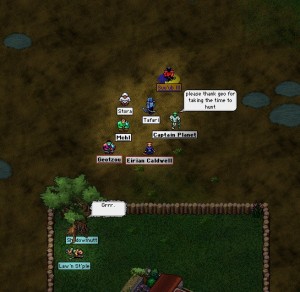If you study MMOs at all, you may have seen Tom Chatfield’s TED Talk in which he talks about what game designers have learned about what keeps people engaged in a game. He identifies the following:
- problem solving –> ambition + delight
- progress bars
- multiple long and short-term aims
- reward effort, don’t punish failure much
- immediate feedback
- uncertainty causes intense engagement
- biggest turn on is other people
Now he was talking about how knowing this might help us to deal with other tasks and challenges, and that was very interesting. But I am also thinking about how Clan Lord does in each of these areas, and it does most of these very well indeed. Except for progress bars; it doesn’t have any!
As I’ve been doing research on CL, I’ve started interviewing players about what keeps them coming back, and in some cases, what has brought them back after being away for months or years. In every single case so far (about 20 people to date) they cite the community as the strongest motivator. That seems in line with Chatfield’s last point, but it’s not just that they have friends in CL. Many players specify that the community is mature and supportive. Though a wide range of ages is represented, the community as a whole is quite mature. Griefing is minimal and when it occurs, other community members address it. Though the forums show the usual flamewars, the gameworld itself remains remarkably free of such conflict.
In terms of support, players are generally very helpful to each other. Because the community is small and everyone is motivated to keep the population up and growing, most players will go out of their way to help newbies get started, supplying not only information, but donating gear, and taking them out to hunt or rescuing them if they get into trouble. Even as players advance though, others will support them in achieving goals such as qualifying for a subclass, acquiring higher level gear, completing quests, and so on. This has been designed into the game in the way that these goals really cannot be completed alone. As everyone knows that they will sometimes need help themselves, they have good reason to help others. Doing so though, players often realize that helping this way is satisfying in itself.
As my character works on goals, I find myself intensely grateful that the game is designed this way, or Eirian would be sunk! 🙂

